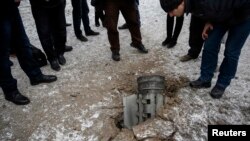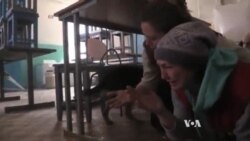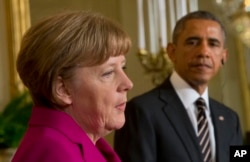The White House says President Barack Obama spoke by phone Tuesday with Russian President Vladimir Putin, urging the Russian leader to back a peace deal for Ukraine set for review Wednesday at a four-nation crisis summit in Belarus.
Obama's call, described in a White House statement, came as Ukraine reported that rocket strikes in the eastern city of Kramatorsk killed at least 12 people and wounded more than 80 others.
Watch a related TV report by Cindy Saine:
The Ukraine Foreign Ministry blamed pro-Russian separatists for the latest violence, calling the rocket barrage "a deliberate massacre of the city's civilians."
The White House statement said Obama "underscored "the rising human toll" of the fighting, as well as the importance of Putin "seizing the opportunity" to back peace proposals when he meets Wednesday with the leaders of France, Germany and Ukraine in Minsk.
Kyiv and a host of Western governments accuse Moscow of backing the nearly yearlong rebellion in Ukraine's east with troops, strategic planning and military hardware.
The president emphasized the importance of reaching and implementing a negotiated settlement. He said, however, if Russia continues its aggressive actions in Ukraine - including sending troops, weapons, and financing the separatists - the costs for Russia will rise.
Meanwhile, rocket strikes in the eastern Ukrainian city of Kramatorsk on Tuesday hit the headquarters of the military's operation against Russia-backed separatists and residential areas ahead of a key summit aimed at ending the conflict.
Ukrainian National Security and Defense Council Secretary Oleksandr Turchynov said that according to "preliminary data," the rebel rocket attacks on Kramatorsk killed 15 people and injured another 63, including five children.
The Donetsk regional administration reported that 32 of those injured were servicemen at an airfield struck by a rocket.
President Petro Poroshenko told Ukraine's parliament that rebels launched two salvos targeting Kramatorsk: one trageting the headquarters of the "anti-terrorist operation" in eastern Ukraine, while the second hit residential areas of the city.
Ukrainian presidential adviser Yuri Biryukov wrote on Facebook earlier Tuesday that two servicemen were killed and nine others injured at the military headquarters.
'People cowering in fear'
VOA's Daniel Schearf, who is reporting from Kramatorsk, was nearby when the rocket attack occurred.
He tweeted shortly after the incident: "I'm in #Kramatorsk. Was 2km down the road when Grads struck. Crazy loud. People cowering in fear. They hoped the war had finished here."
Schearf also saw an unexploded rocket in a residential area of Kramatorsk.
Kramatorsk is more than 50 kilometers (30 miles) away from the nearest fighting in Donetsk.
Prior to the attack, Kyiv military spokesmen said at least seven Ukrainian soldiers had been killed in the last 24 hours of fighting in the east of the country.
At the front in Vuhlehirsk, a small town captured by rebels last week, volleys of artillery crashed in both directions. The rebels are pushing to encircle government forces holding out in nearby Debaltseve, a strategic rail hub that pro-Russian separatists have been trying to pry from Kyiv forces.
Earlier Tuesday, pro-government forces had reported making gains.
The Azov Battalion, a pro-Kyiv volunteer paramilitary group, said via Facebook it had captured several villages during an offensive toward Novoazovsk, a town on the border with Russia.
Kyiv also announced on Tuesday that its forces had launched a counteroffensive for the coastal town of Mariupol, the biggest city in the rebellious provinces still in government hands. Details of that counter-offensive could not be confirmed.
The upsurge in violence comes as representatives of Russia, Ukraine, Germany and France are due to meet in the capital of Belarus on Wednesday to try to come up with a peace deal to end the 10-month conflict that has claimed at least 5,400 lives.
Decrying the rocket attack on Kramatorsk, Poroshenko said the next few days could be vital to Ukraine's and Europe's future.
“Maybe these few days would be crucial, not, most importantly in our history, but in the history of Europe of the 21st century,” he said.
Meanwhile, Nikolai Patrushev, the secretary of the Security Council, a Kremlin advisory body of top defense and security officials, was quoted Tuesday by a Russian government newspaper (Rossiiskaya Gazeta) as saying the United States is using the situation in Ukraine as a pretext to "contain" Russia.
"The Americans are trying to draw the Russian Federation into an international military conflict, [and] by means of the events in Ukraine to achieve a change in government and ultimately to dismember our country," it quoted Patrushev as saying.
Diplomacy
U.S. President Barack Obama spoke to Poroshenko on Tuesday about the situation in Eastern Ukraine, the White House said on Twitter.
The two leaders discussed ongoing work by U.S. and European leaders to establish a cease-fire in the region and a peace deal with neighboring Russia, the White House said.
On Monday, Obama said he will await the outcome of the talks before deciding whether to supply Kyiv with lethal defensive weaponry in its fight against the separatists.
Obama spoke in Washington alongside German Chancellor Angela Merkel. He said diplomacy and sanctions remain his preferred methods for ending Russian support for the rebellion in eastern Ukraine.
But he said he had instructed key advisers to examine the plausibility of supplying Kyiv with weaponry, in the event that diplomacy fails to bring peace.
Ukraine leaders insist that such hardware is necessary to offset recent rebel military gains and end the uprising near the Russian border.
For her part, Merkel said she sees no military solution to the conflict, and repeated her insistence on a diplomatic solution to the crisis.
However, Britain Foreign Secretary Philip Hammond on Tuesday his country was also keeping under review its decision not to offer lethal military aid to Ukraine.
Hammond told parliament that while he believed there was no military solution to the conflict, he could not allow the Ukrainian military to collapse.
Last week, the German chancellor and French President Francois Hollande carried a peace proposal to Moscow, where they met with Russian President Vladimir Putin.
That meeting was followed by four-way phone talks that included Ukraine's Poroshenko on Sunday. The quartet agreed to hold face-to-face talks in Minsk.
Minsk Talks on Ukraine
Minsk Talks on Ukraine
Talks on how to resolve Ukraine crisis will focus on withdrawing heavy weapons, creating a demilitarized zone in eastern Ukraine and starting a dialog between Ukraine and the rebels, RIA news agency quoted a diplomatic source as saying on Tuesday.
France, Germany, Russia and Ukraine are due to meet in the Belarussian capital Minsk on Wednesday for the talks.
German Foreign Minister Frank-Walter Steinmeier phoned his Russian and Ukrainian counterparts on Tuesday urging them to be ready to compromise on difficult open questions, a day ahead of a summit of Russian, French, German and Ukrainian leaders on the Ukraine crisis.
Source: Reuters news agency
Hollande, speaking Sunday, said the upcoming talks present "one of the last chances" for reaching peace after nearly a year of fighting in eastern Ukraine.
The French-German plan is based on September's failed cease-fire, but with more details on timing, according to a senior U.S. State Department official.
Putin said in a message to diplomats and Foreign Ministry employees Tuesday, on what is observed in Russia as Foreign Service Day, that regardless of external pressure, the country "will continue to pursue an independent foreign policy, one that represents the fundamental interests of our people and is in line with global security and stability."
Military exercises
On Tuesday, hundreds of Russian troops started military exercises in southern Russia near the border with Ukraine, in a show of strength before a summit on the Ukraine crisis in the Belarussian capital Minsk, Reuters reported.
News agencies quoted military officials as saying that about 2,000 Russian reconnaissance troops had started large-scale exercises in the southern military district.
Separately, more than 600 soldiers had started training in the southern Crimea peninsula, and in Kamchatka, in Russia's east, 2,500 soldiers of the Pacific Fleet and joint forces were checked for military readiness.
Also Tuesday, Ukraine's parliament voted to approve President Poroshenko's proposal to dismiss General Prosecutor Vitaliy Yarema, who has been criticized over the stalled probe into the killing of more than 100 demonstrators during protests in Kyiv last February.
Deputies, activists and the country's Western backers have regularly accused the prosecutor's office of failing to tackle corruption and roll out reforms.
In Moscow, a court on Tuesday extended for three months the detention of Nadezhda Savchenko, a Ukrainian army pilot held on charges of providing coordinates for a mortar attack that killed the two journalists in June 2014.
Savchenko has been on a hunger strike since Dec. 13 to protest what her lawyers call absurd and politically motivated charges.
Some material for this report came from Reuters and AP.









